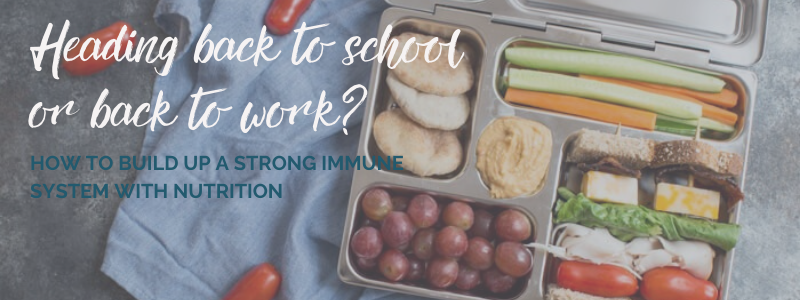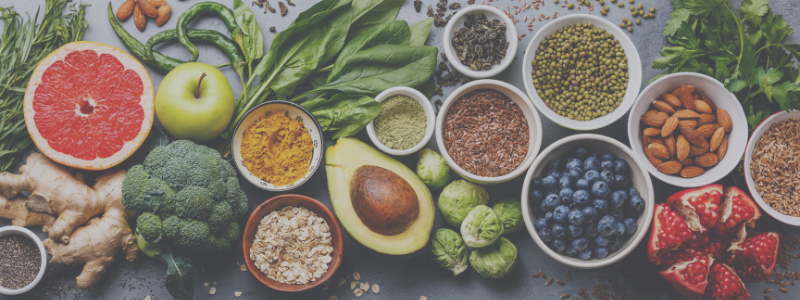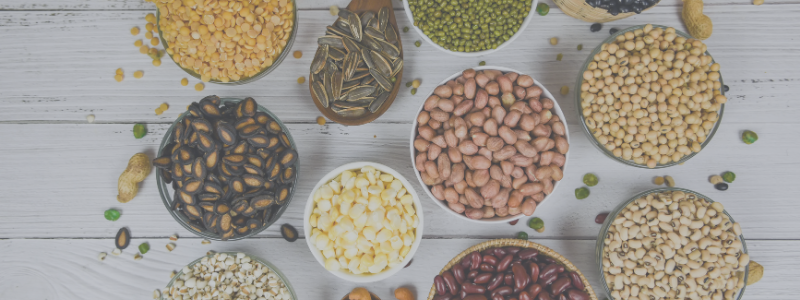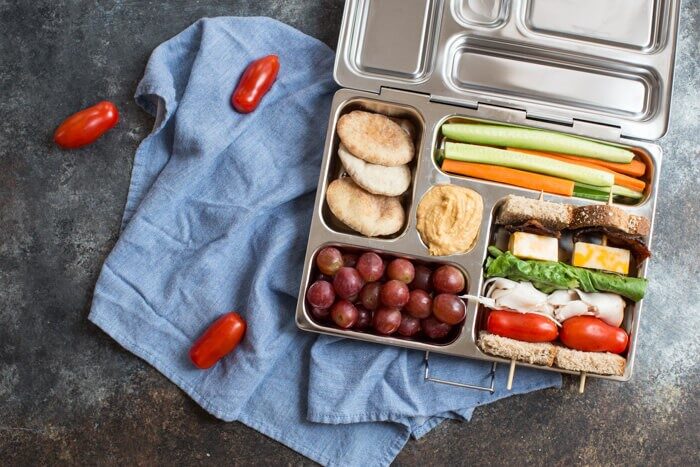Heading back to school or back to work? How to build up a strong immune system with nutrition

By: Gillian Ronald, Registered Dietitian and Health Coach
September means back to school! Whether your heading back to class or work, boosting your immune system this year is more important than ever.
The immune system is a complicated and fabulous force. It works adaptively to track down invaders (viruses, bacteria, rogue proteins) and develops antibodies against them to attack and conquer.
Our bodies work in many miraculous ways to stay healthy; skin, GI tract cells, and respiratory cells being at the top of the list to stop invaders. We need an array of vitamins, minerals and nutrients to build these healthy cells, and to give our immune system the fuel it needs to produce antibodies.
Vitamins C and E are antioxidants that protect cells and tissues from free radicals produced when your immune system is fighting a virus. Initiating an immune response requires B vitamins. And the body requires copper, iron, magnesium, selenium, vitamin D, zinc to keep that immune system firing.
How to Boost your Immune System with Nutrition
The best way to ensure you are eating well for a pumped-up immune system is: you guessed it, real, whole foods.
So, when you are packing lunches and snacks to send your little ones to school and sports, or planning your family meals for the week, here are some items to include:
Fruits and Vegetables
No shocker here, fruits and vegetables supply vitamins A and C, antioxidants, and fibre to fight germs and maintain a healthy GI system.
Pack baby carrots, pepper and cucumber slices, strawberries, orange wedges, grapes, watermelon. At dinner focus on green vegetables: broccoli, green beans, peas, arugula and spinach.

Nuts and Seeds
These nutrition power houses supply vitamins and minerals like Vitamin E and fiber, protein and healthy fats. Almonds contain copper and magnesium, sunflower seeds have selenium, copper, folate and zinc, hazelnuts, pistachios and walnuts provide vitamin B6.
Many schools and places of work don’t allow these nut items in lunch kits, so consider baking up a batch of muffins, energy bites or breakfast cookies to eat in the A.M or in the car on the way to after school activities.
Whole grain breads, beans and lentils
Choosing beans and whole grains contribute nutrients and contain fiber to help replenish healthy intestinal bacteria.
- Lentils are a good source of copper, folate, and iron
- Chickpeas and black beans provide zinc.
- Whole-grain breads and cereals and whole grains such as oats and quinoa supply B vitamins, copper, iron, magnesium, and zinc.
Make up a batch of chili on the weekend with tomatoes, lentils, black beans and serve with whole grain bread. Leftovers can be packed into a thermos for a warm school lunch with a whole grain bun.

Avoid Added and Excess Sugar
Skip the pop, the juice boxes, the gummy treats, the sugary granola bars. Added sugar, or excess sugar can contribute significantly to obesity, type 2 diabetes, and heart disease- all of which can suppress your immune system.
Lowering sugar intake can decrease inflammation, which means your immune system can focus on bacterial and viral invaders.
Limit intake to less than 25 grams (or two tablespoons) of added or excess sugar daily. Read labels carefully, one Sun Rype Pure Apple juice box has 24g of sugar, 1 cup of fruit loops is 15g and a Quaker chocolate chip granola bar is 5g. Those numbers add up quick!

Stay hydrated
Hydration doesn’t necessarily protect you from germs and viruses, but preventing dehydration is important to your overall health. Dehydration can hinder mood, digestion and heart and kidney function, thus increasing your susceptibility to illness.
Water is the best choice. Send kids to school with water bottles. A hydrated body will think clearly, function well, flush out extra salt and keep your GI tract running smoothly. Urine should be very pale yellow. Dark yellow urine is a sign that you are already dehydrated.
Add slices of lemon, orange, grapefruit or cucumber to your water for added flavor and vitamin C. (I send my kids water bottles with Emergen-C packets in them for school).
School lunches: What to Pack
A sample lunch for a school age child would include lean protein, healthy fats, fruits and vegetables and water.
Children can be picky, and love choice, so you may want to consider using a compartmentalized lunch box. Variety and choice mean your child will likely have a little bit of everything. Think of it like a tiny healthy buffet!
And if some of it comes home uneaten, don’t stress. Children’s appetites vary depending on stages of growth and activity levels.

Work Lunches: What to Pack
Adults should focus on the same fundamentals; fruits and vegetables, lean protein, healthy fats and water.
Try a whole pita stuffed with turkey, arugula, sprouts and avocado, baby tomatoes and orange slices on the side. If your workplace allows, 1/3 cup pistachios and 1 cup of strawberries is an awesome snack.
The key to maintaining a healthy immune system through nutrition is whole unprocessed foods, lots of colorful fruits and vegetables and staying properly hydrated. There is nothing that can prevent you from coming into contact with bacteria and viruses, but a strong immune system can lessen the impact and keep you on track with your day to day activities.

Get More Tips and Support from Nutrition Counselling with Gillian Ronald
Learn to increase your energy, maximize your fitness, build a healthier family with customized one-on-one support from Registered Dietitian and Health Coach Gillian Ronald.
ABOUT MPH
HOURS OF OPERATION
Mon: 7AM - 7PMTues: 7AM - 7PM
Wed: 7AM - 8PM
Thurs: 7AM - 7PM
Fri: 7AM - 5PM
Sat: 7AM - 2PM
Sun: 10AM - 3PM
Copyright © 2023 Movement Performance & Health. All rights reserved.

